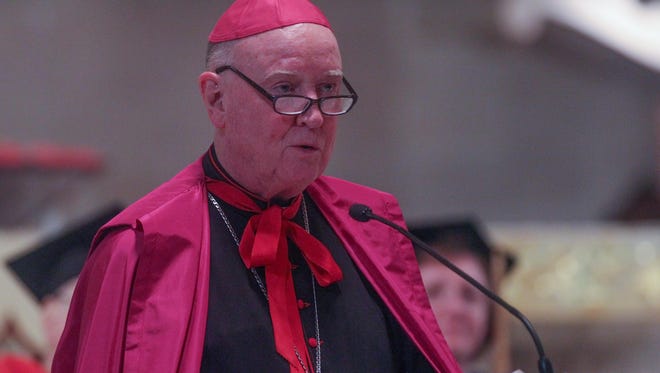Former Catholic Diocese of Wilmington Bishop W. Francis Malooly was one of several past high-ranking Archdiocese of Baltimore officials identified as those who helped cover up sexual abuse, according to a Baltimore Sun exclusive article published online late Thursday.
Malooly — along with the Most Revs. Richard “Rick” Woy, G. Michael Schleupner, J. Bruce Jarboe and George B. Moeller — helped abusive priests get away with their crimes, either concealing the extent of a priest’s misdeeds or striking deals with prosecutors to avoid a criminal charge, according to the Sun’s article.
The five were among the most powerful, high-ranking and visible officials in the archdiocese, which comprises Baltimore and nine of Maryland’s 23 counties in the central and western portions of the state. Its annual directories show some served as chancellor, effectively the right hand of the late Cardinal William Keeler or the late Archbishop William Borders. Others were directors of clergy personnel, akin to a human resources manager. Other times, they were in charge of archdiocesan finances.
Malooly, who was reached at his house in Brandywine Hundred on Friday afternoon, referred comment to Christian Kendzierski, a spokesman with the Archdiocese of Baltimore. Kendzierski did not have much to say.
“Considering this topic is possibly centered around a court ordered process, I don’t have anything to offer in response,” he told Delaware Online/The News Journal.
The Catholic Diocese of Wilmington, where Malooly most recently served until 2021, could not be reached for comment by Delaware Online/The News Journal on Thursday night.
How is Bishop Malooly involved?
The incidents described by the Sun occurred before Malooly became bishop of the Catholic Diocese of Wilmington in 2008. The following year, the Wilmington diocese sought Chapter 11 protection after a flood of civil lawsuits were filed by survivors of clergy sexual abuse under provisions of Delaware’s 2007 Child Victims Act.
The 2007 law opened a two-year window for child sexual abuse cases that would otherwise have been barred by the statute of limitations.
“Our hope is that the Chapter 11 proceedings will enable us to fairly compensate all victims through a single process,” Malooly said in 2009.
He later noted that this move would allow all victims to see compensation.
BACKGROUND:Wilmington Catholic Diocese files for bankruptcy protection
“We have a finite amount of resources and it became clear we would never get through 142 complainants in any fair or equitable way,” Malooly said.

The diocese emerged from bankruptcy in 2011, paying $77.4 million into a trust fund to resolve all claims by abuse survivors and another $10 million into a pension fund for lay employees that was found to be underfunded during financial disclosures.
“The corruption in the Church over the last 60 years is beyond belief,” attorney Thomas S. Neuberger said to Delaware Online/The News Journal on Thursday night after the Sun story was published. Neuberger’s firm represented an overwhelming majority of victims who sued the Wilmington diocese.
“The use of Bishop Malooly is further proof that all it seeks is to protect its wealth and power,” he said. “Claims that it now has procedures in place to protect children are mere window dressing. Parents are not fooled by all that and the proof is the continuing declining enrollment in church schools.”
Malooly’s role in the Baltimore Sun’s reporting
According to the Sun’s article, its reporters reviewed thousands of pages of court records, decades of archdiocese directories, and dozens of contemporary newspaper articles to piece together details that helped reveal the men’s identities. People with knowledge of their conduct at the time or who are familiar with the report confirmed The Sun’s reporting.
One specific case reported by the Sun involves Malooly, then the director of the clergy personnel division, contacting the office of the Maryland state’s attorney in Baltimore and describing an accusation against a clergy member without naming him.
The Sun’s reporting claims Malooly never reported the accusation, citing a Maryland attorney general’s report.

Is this the first time Malooly has come under question?
No. Malooly, who was assigned to the Archdiocese of Baltimore before he became Wilmington’s bishop in 2008, was named in a 2017 Netflix docuseries that claimed he tried to cover up sexual abuse by a Baltimore priest decades ago.
Malooly was mentioned only in the final episode of the series and posted to the Diocese of Wilmington’s website a lengthy statement challenging the accusations after the show ran.
BACKGROUND:Bishop Malooly denies Netflix series ‘The Keepers’ allegations
In 2018, after a Pennsylvania grand jury released a report detailing sexual abuse claims in six Pennsylvania dioceses by hundreds of priests, Malooly – then-bishop of the Diocese of Wilmington − released a statement as church leaders in neighboring states came under question.
“Here in the Diocese of Wilmington, we have demonstrated a continuing commitment to preventing sexual abuse,” Malooly said. “We are grateful that the Diocese of Wilmington has not had a reported instance of the sexual abuse of a child by anyone in diocesan or parish ministry in over 25 years. Our policies, procedures, training, and continuing commitment makes our churches and schools safe places for children.”
MORE TO READ:Bishop Malooly responds to questions regarding the Pennsylvania grand jury report
Contact Esteban Parra at (302) 324-2299 or eparra@delawareonline.com.